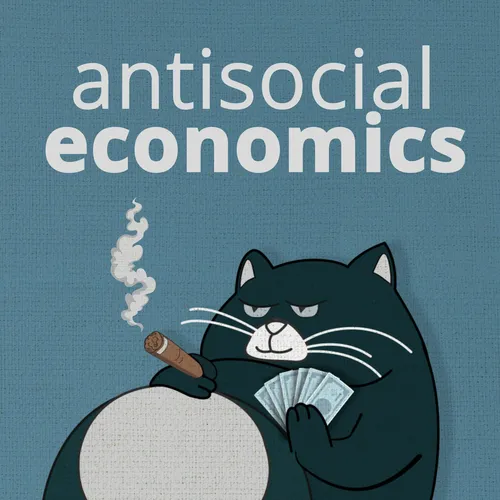
Antisocial Economics
What is wealth? How come so many of us haven’t got any? How does wealth inequality make poverty worse? In the UK and other rich economies, wealth inequality and poverty are at incredibly high levels. A very small number of people are very rich and most other people are not. An increasing number of people live in poverty.
Should there be limits to the amount of wealth one person can own? How come so many wealthy people are so dependent on state handouts? Why is it so hard to do anything about it? While we know a lot about poverty, we know a lot less about wealth. Did you know that the UK Office for National Statistics only started tracking wealth and assets in 2006? And Thomas Piketty’s Capital in the 21st Century broke new ground with its historical wealth data in 2013. This is all remarkably recent.
Podcast host Sarah Kerr is a researcher who explores the links between wealth, poverty and power. In this first series of Antisocial Economics, Talking about Wealth, Sarah talks to academics and campaigners about:
- The role of wealth in the widening sense of economic insecurity and electoral volatility - (with Professor Jane Green, University of Oxford. Which demographics are feeling the most financial distress and why might this matter for future elections?
- What we mean by poverty and wealth and what the relationship is between them - (with Professor Mike Savage, (London School of Economics,) and Professor Jonathan Wolff, (University of Oxford). Is there something specific about wealth as form of economic resource that should change how we think about poverty?
- The colonial history of wealth and its implications in the contemporary racial wealth divide, (with Professor Gurminder Bhambra, Sussex University). Who actually paid for the things we think of as ‘ours’ (like the NHS))?
- Whether there should be limits on wealth (with Fernanda Balata (Political economist at New Economics Foundation) and Luke Hildyard (Director, High Pay Centre). Is there a point at which wealth causes social harm? What is ‘enough’?
- The hidden world of tax expenditures - (with Professor Emeritus Adrian Sinfield, (University of Edinburgh). Why do we know so little about a huge government expenditure that benefits higher income earners the most?
- Why is it so hard to do anything about it? (with Will Snell (CEO, Fairness Foundation), Dr Michael Vaughan (Research Fellow, LSE) and Dr Jonathan Mijs (Associate Professor, Boston University)). What is it about public attitudes and perceptions of the economy, of wealth, the wealthy and wealth inequality that makes change hard to achieve?
Antisocial Economics is an informed and accessible space for thinking and talking about wealth as a social problem, and specifically, for thinking about the effects of extreme private wealth ownership on social and environmental sustainability.
So why is the podcast called ‘Antisocial’ Economics’?
The economy isn’t working for most people, and wealth inequality is at the heart of the problem. We all work hard, but the wealth we create together is extracted to enrich a few men at the top. It feels unfair. And that’s because, frankly, it is!
This podcast is for anyone who wants to understand our social economy in a more critical way. Whether you are:
- A student or researcher interested in inequality and social justice
- A professional working in economics or public policy
- Or a concerned citizen trying to make sense of rising inequality
Antisocial Economics is hosted by Sarah Kerr, a Research Fellow at the International Inequalities Institute. In 2024, Sarah published Wealth, Poverty and Enduring Inequality, Let’s Talk Wealtherty Starting from the premise that continuing to centre poverty encourages researchers and policymakers alike to 'look down' she contributes to a strand of work that asks what happens if we 'look up'?
- Update frequency
- every 7 days
- Average duration
- 45 minutes
- Episodes
- 7
- Years Active
- 2025

Episode 6: What and how does the public think about wealth and wealth inequality, and what kinds of narratives make them more or less supportive of change?
If we want action on extreme wealth, how we frame it as a problem in the media and in campaigning activity matters.
Specific ways of talking about it make the public more or less likely to support re…

Episode 5: The social division of tax policy: Who really benefits?

Episode 4: When does wealth become harmful? Should there be limits?

Episode 3: The colonial foundations of contemporary wealth gaps: What are the links between past injustice and present inequality?

Episode 2: How do we define and measure poverty and wealth, and what is the relationship between them?

Episode 1: How does economic insecurity help to explain Britain’s political volatility? And what is the role of wealth in this equation?
